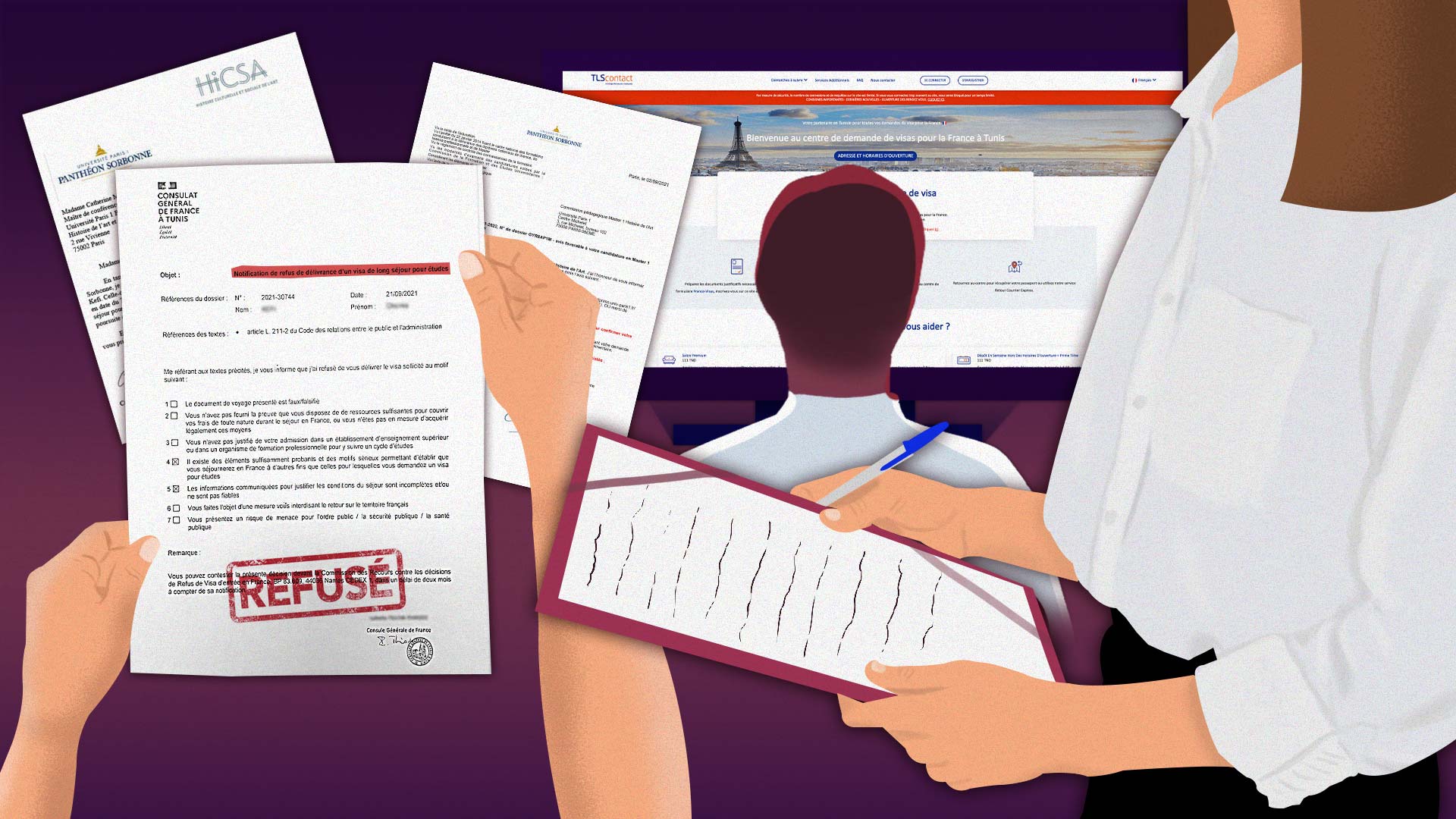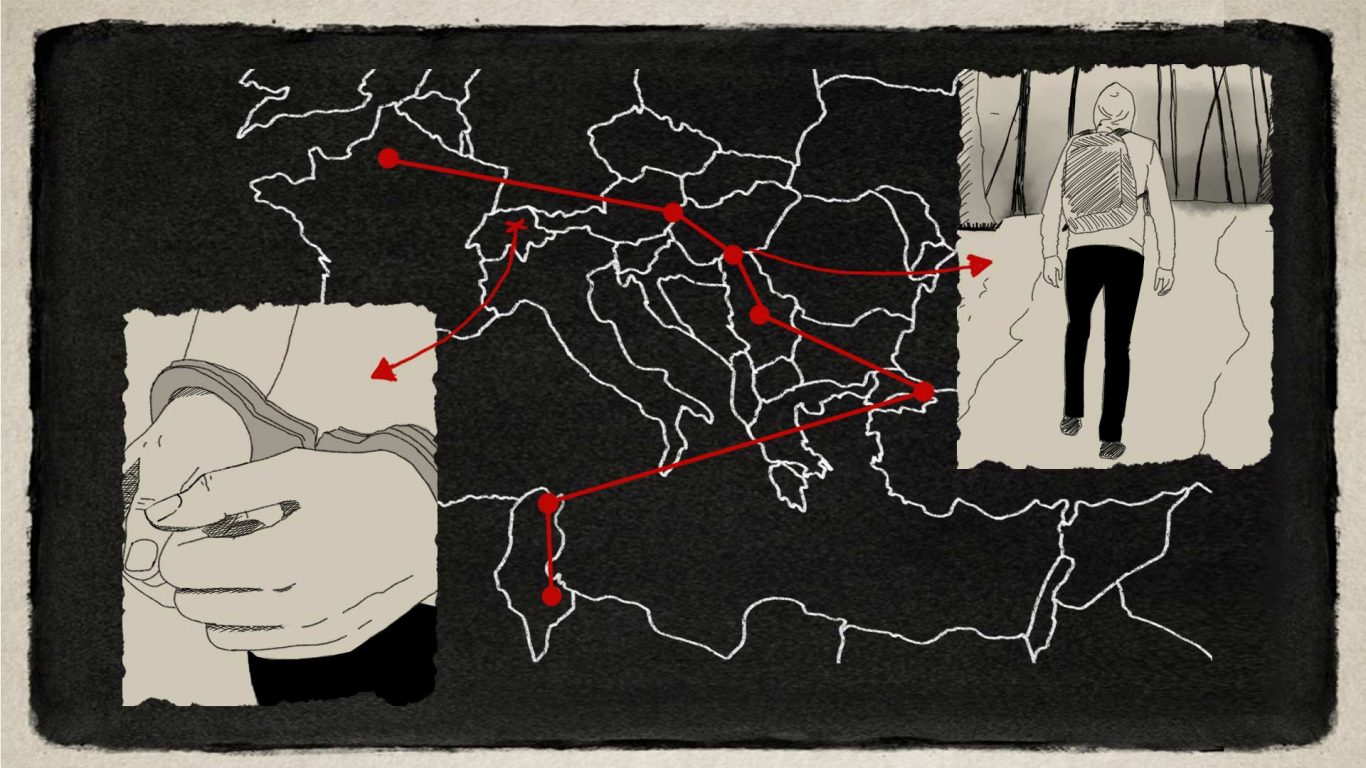In 2021, Chaima, an architect living in Tunis, received an acceptance letter from Université Paris 1 Panthéon-Sorbonne granting her admission to pursue a master's degree in art history. Envisioning a future in the French capital and the prospect of reuniting with her family, the young woman's hopes were shattered when her student visa application was unexpectedly rejected. Two years later, she still doesn't understand why.
Chaima's application process, however, was smooth. She attended the compulsory interview with Campus France, an agency affiliated to the Institut français de Tunisie (IFT), and paid the 250 dinars application fee. During the interview, Tunisian agents asked her questions in French about her reasons for choosing France and her degree. The confident young student eloquently explained that the program would be an ideal complement to her nine years of higher education. Chaima left the interview feeling very confident.
So, when she received her visa rejection letter from the French Consulate, she was shocked.
"I'm not the only one in this situation. So many students have been through the same thing. it's such a shame," laments Chaima.
This is not an isolated incident. Tunisians wishing to travel to France, and Europe in general, are all too familiar with these feelings of disappointment and confusion. The visa procedure has become a barrier obstructing their dreams and aspirations.
An uphill battle
Tunisia has witnessed a significant increase in visa applications to European countries, with France being the top choice for many Tunisians. In 2019 alone, there were over 170 000 visa applications*. However, there has also been a steady rise in the visa rejection rate from Consulates. In 2012, the average refusal rate stood at just 12.04%, while in 2019, it reached 24.3%. When contacted regarding this matter, the German Consulate noted that Tunisia has the lowest rejection rate among countries of the Maghreb and emphasized that it has not "significantly increased since 2017".
Beneath these figures lies a prevailing sentiment of humiliation among Tunisian visa applicants, as they must navigate through a lengthy and obscure process. The complications begin right from the moment appointments are booked through the TLScontact website. Acting as an intermediary on behalf of Consulates, this private company handles the administrative procedures associated with visa applications.
Between appointment deadlines and compiling the file, applying for a visa is a real hassle. "Nothing is certain, I've sent in all the supporting documents, property deeds, work certificates, pay slips, currency exchange, hotel reservations...", enumerated Zeineb, another visa applicant.
"A file that weighs over two kilos! I think it's weird to have to prepare a folder that big just to be able to visit a country."
To simplify the process of compiling their application files, some applicants find themselves in need of help, for an extra few hundred dinars. External intermediaries provide various support services, ranging from photocopying to the complete compilation of the required documents. They are conveniently located in offices scattered near TLScontact. Many, however, are considered fraudulent by official authorities.
"They may see it that way. Personally, I believe that I am offering a legitimate service. I'm licensed, I pay taxes, I have employees… It's all according to the law, it's completely transparent", asserted Hamza who has been providing visa application assistance for over eight years.
It's a family business: "My father used to have a few contacts in the business world and used to prepare their visa application files. When he retired, he opened his own office. So, he had a clientele and encouraged me to learn the trade", he recounted. His sister also handles applications for the USA and Canada, while Hamza deals with Schengen countries. Initially uninterested, he eventually grew to enjoy the job.
"You think about ways to help people and how to find tricks that can make their files more attractive," said Hamza enthusiastically.
Tunisian, Algerian, Libyan, judges, doctors, teachers, farmers... "I help everyone. Visas aren't just for certain people," added Hamza proudly. In just a few hours, he is able to find a way to add value to each profile, in an effort to convince the Consulate to grant the invaluable sesame. "For someone who owns a clothing store, for example. I provide purchase and sales invoices, and explain why they want to travel: for discounts, to get a price they can't find in Tunisia, etc.", Hamza explained.
"Let's take the case of a farmer. Do they have cows? Are they vaccinated? Bring me the vaccination certificate. Do they buy them feed? Bring me the feed purchase invoices. (...) It's a very clear file (...) It's a whole strategy".
Once the file has been compiled, the next step is booking an appointment. In May 2022, Dominique Mas, the Consul General of France, announced that the TLS website would only allow three connections per computer per day, so as to limit the number of automatic appointments booked by 'bots'.
Available slots are displayed from midnight onwards. Every evening, Hamza gets ready for the appointment race. "I have all the files and forms ready. I open all the Chrome and Firefox browsers, and I just keep refreshing..." he described frantically. "My father has his assistant, my sister has her assistant, and as soon as one of us sees an opening, we immediately call each other." They then divide up the appointments for their clients.
Despite all his experience and motivation, Hamza no longer takes on applications to France. Getting appointments has just become too frustrating over the past few months. "Forget about France! It's impossible to get an appointment!" he confirmed. "Before, even during peak periods, you could get your appointment within three weeks at most. But since the Covid-19 pandemic, appointments have become extremely limited."
French Consul Dominique Mas promised, in a media interview, to overhaul the appointment system so as to process the ever growing number of applications. As of now, an online calendar displays available slots one month in advance. The last appointments made available in May 2023 were gone in a matter of hours. When contacted by inkyfada, the French Consulate declined to provide any further information.

Raouaa*, 500 dinars wasted
It's July 2022. Raouaa is on leave, but hardly enjoying her time off spent in endless administrative waiting lines. This Teleperformance employee is determined: she will be attending her sister's wedding in September, along with one of her children, her seven-year-old son. Raouaa is familiar with the procedure, and this wouldn't be her first trip to France on a Schengen* visa.
It took months of painstaking organization to compile her file: "days off have to be planned two or three weeks in advance... and it's not easy to get time off at Teleperformance, especially if it's for paperwork", Raouaa sighed. In her spare time, she scours the Tunisian capital to gather all the necessary documents: Social Security records, employment certificate, insurance, hotel reservations and plane tickets. She thinks the amount of information requested is both excessive and unfair. Nevertheless, Raouaa always makes sure she has absolutely everything she needs.
"France doesn't need to know my personal details, my personal life [...] But I still gave them everything they asked for. I even put my daughter's birth certificate with my leave of absence as proof. I don't intend to stay in France. I have a life, I have my job, I have my family", Raouaa explains.
Raouaa also put aside a substantial sum of money to make her application more attractive. The supporting documents required by the official France-Visas website include an expense budget to be used on French territory. This amount must be converted into euros, and the conversion receipt added to the visa application file. "If you make a hotel reservation, you have to pay 120 euros per day per person," said Raouaa, "which I did, of course. Just like I did for the previous applications". On top of this there are the visa fees, 404 dinars for Raouaa and her son. "And if we get rejected, we don't even get our money back!" she exclaimed.
A total of almost 500 dinars spent, 2800 put aside, vacation days wasted, and a month of anticipation and anxiety: that's what you have to endure for a week's vacation in France.
A Schengen visa costs 80 euros (269 Tunisian dinars) for a short stay, and 99 euros (333 dinars) for a longer one. Students pay 50 euros. These costs do not include service fees, which are paid directly to TLScontact: around 100 dinars, not counting optional services such as the Premium service, which costs 111 dinars.

Screenshot taken on June 22, 2023 from the TLScontact website
Despite her best efforts, Raouaa and her son's applications were rejected for reason 10, which questions the reliability of the documents presented, and they had to miss the family reunion. Although Raouaa is furious, she hasn't given up on the idea of returning to France: "I'm not going to give up. I have my sister, my cousins, and almost my entire family in France. Besides, my son's dream is to see the Eiffel Tower," she laughed. For several months, she has been anxiously checking the TLS website to book a new appointment, but they're extremely rare and disappear in the blink of an eye.
Upon visa application rejection, applicants are provided with a basic document with their passport listing the various reasons for refusal, without explanation or supporting documents. Testimonies collected by inkyfada indicate that the most commonly cited reasons for refusal in Tunisia include: reason 4, which concerns the amount of financial resources allocated for the trip; reason 10 which questions the reliability of the provided information justifying the purpose of the stay; and reason 13, which challenges the applicant's intention to leave the Schengen territory before the visa expiration date.
"Today, even if all the documents are in order, they still use reason 10," commented Hamza, who has been witnessing an increasing number of applications being rejected on these grounds. He believes that the ambiguity surrounding this refusal prevents applicants from challenging the decision, since the Consulate does not specify which documents are 'suspicious'.
"Getting a visa has become as complicated as it was in the early 2000s, especially after the September 11 [2001] attacks. We're practically in the same situation today," shares Hamza.
The Consulates involved are often claiming that these rejections are due to incomplete files or missing documents. When contacted by inkyfada, the German Consulate echoed the same reasoning. France declined to provide additional information, while the response from the Belgian Consulate is still pending.
Border control: Campus France takes charge
Despite the visa refusal, Chaima, the architect wishing to study in Paris, hasn’t yet given up on the idea of moving to France. She first lodged an appeal with the French Consulate, along with a supporting letter from the Head of the Art History Department at the Sorbonne, but got no response.
"So, I moved on to the second phase, an appeal to the Commission for Appeals Against Visa Refusal in Nantes, but again, no sign of life. I realized that it was absolutely pointless," Chaima said with resignation. Available statistics indicate that this commission responds to only 45% of requests and rejects 98.6% of appeals.
In a last ditch attempt, Chaima contacted the Head of the Institut Français in Tunis, hoping for some kind of assistance. Radio silence.
The young woman harbors suspicions that her application was rejected by Campus France due to a previous refusal in 2016 when she applied for an architecture degree in France. According to her, "Campus France is the obstacle standing in the way of everything. The interviewer who assesses the candidate submits a report to the Consulate." However, Chaima has no means of confirming this theory as Campus France remains entirely inaccessible throughout the entire process, leaving her questions unanswered.
Ahmed Jemaa, a researcher working on borders between Tunisia and the European Union, confirms the influential role of Campus France in getting a student visa: "There's an interview at Campus France for students, and it's supposed to be academic. You’d expect the questions to be about your studies, your background, [...]. But the key part of the interview is remote monitoring," he emphasized.
"A French institution accepts students, based on grades, interviews, and academic performance. So to have an institution accept this student and have another French institution deny them their visa is just absurd", argues the researcher.
Ahmed Jemaa believes that Campus France is acting as a "border controller" by attempting to assess the "migratory risk" that each student presents - and identify those who may overstay their welcome in France. He considers this as “an institutional contradiction”.
The researcher stressed that Tunisian students are "conditioned to study in France", as the two countries share the French language and education system. "People find it easier to go to France because there are partnerships", he continued, "these connections and power relations are the reason why a large number of people can only go to France".
"Studying abroad has to do with the students' desire for fresh and exciting experiences that will help them advance in their careers... When they're faced with rejection, it shatters all their dreams and ambitions. It truly is a devastating experience."
Contacted by inkyfada, Campus France did not respond to the request for an interview.
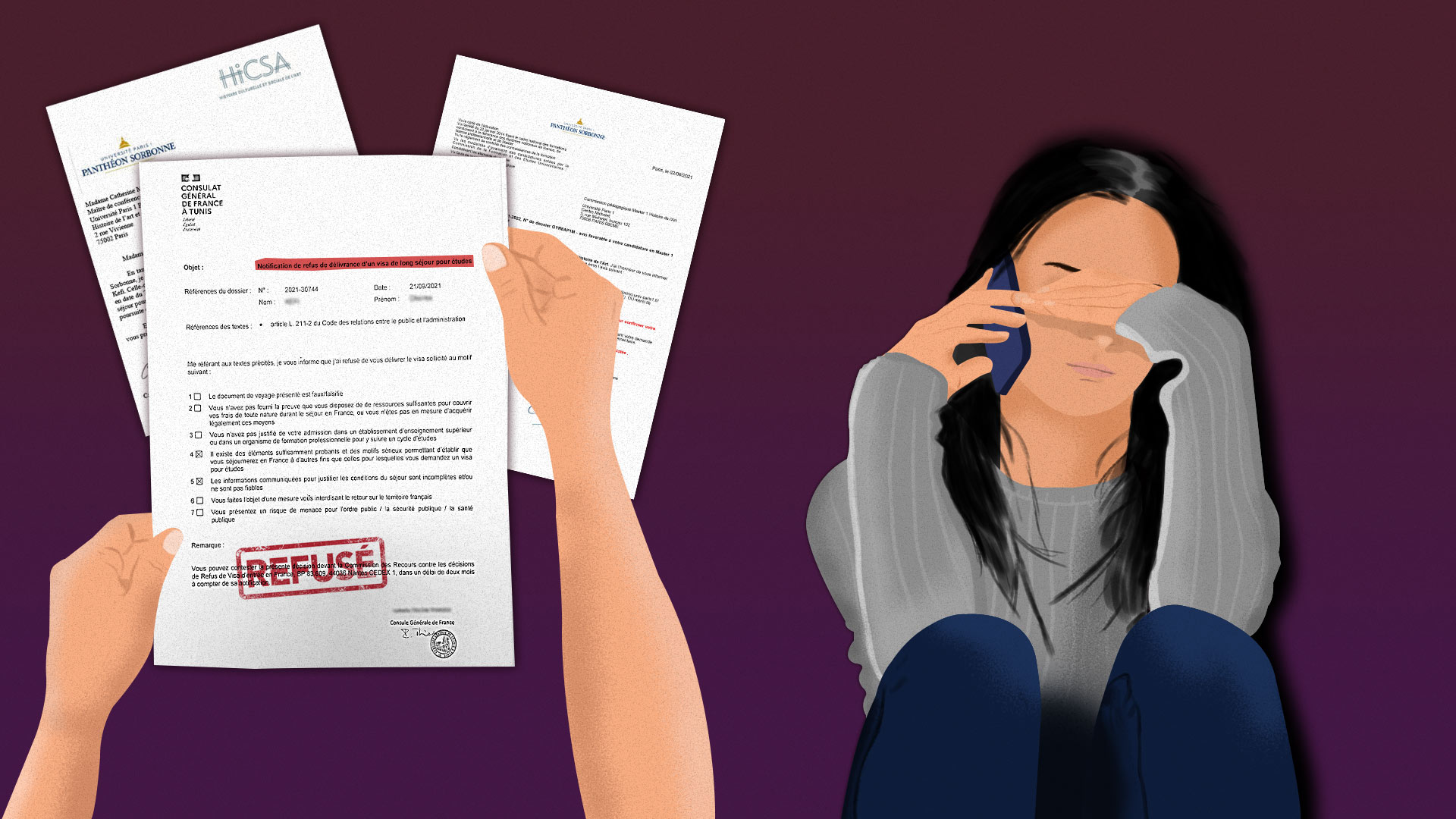
An opaque and random process
Two years later, Chaima has accepted the reality that she won't be able to reunite with her mother in France. She currently works in an architecture office in Tunis and has taken up studying Italian and English with the aim of “expanding [her] opportunities elsewhere”. She's still puzzled by Campus France and the Consulate's decision, and sometimes, she can't help but wonder what she could have done differently.
"It seems that they also base their decision on the candidate's history on their platform, which is inaccessible. It's very confidential. The Campus France system is extremely opaque," Chaima commented.
"The whole process is unclear, you can't really tell what you need to do," confirmed Ahmed Jemaa. He denounced the deliberate lack of information and lack of transparency surrounding the issuance of student visas. Many Internet users resort to social network groups to seek advice and try to better understand the system. "It's not a question of preparation. It's very random. I've met people who were accepted into prestigious universities but still couldn't get the visa", Jemaa recalled.
Hamza is also confused by the French Consulate's refusals. Since 2019, he has been noticing an increasing number of unexplained rejections: "They just do whatever they want. One week, out of 25 passports, I got 22 approvals and three rejections . Another week, I got 15 rejections out of 20 passports. It's really random," he said with a shrug.
Hamza has come across some surprising refusals among the files they handle, "like a judge around 50 years old, who works at the Court of First Instance in Tunis, and whose application was unexpectedly rejected". He thinks that the Consulate sorts applications by job category and prioritizes them accordingly: a well-paid executive would have a higher chance of avoiding rejection than a student, for example. Lately, refusals seem to apply just as much to profiles that decision-makers would typically consider as solid. Hamza suspects that consular agents merely skim through the files without thoroughly examining them.
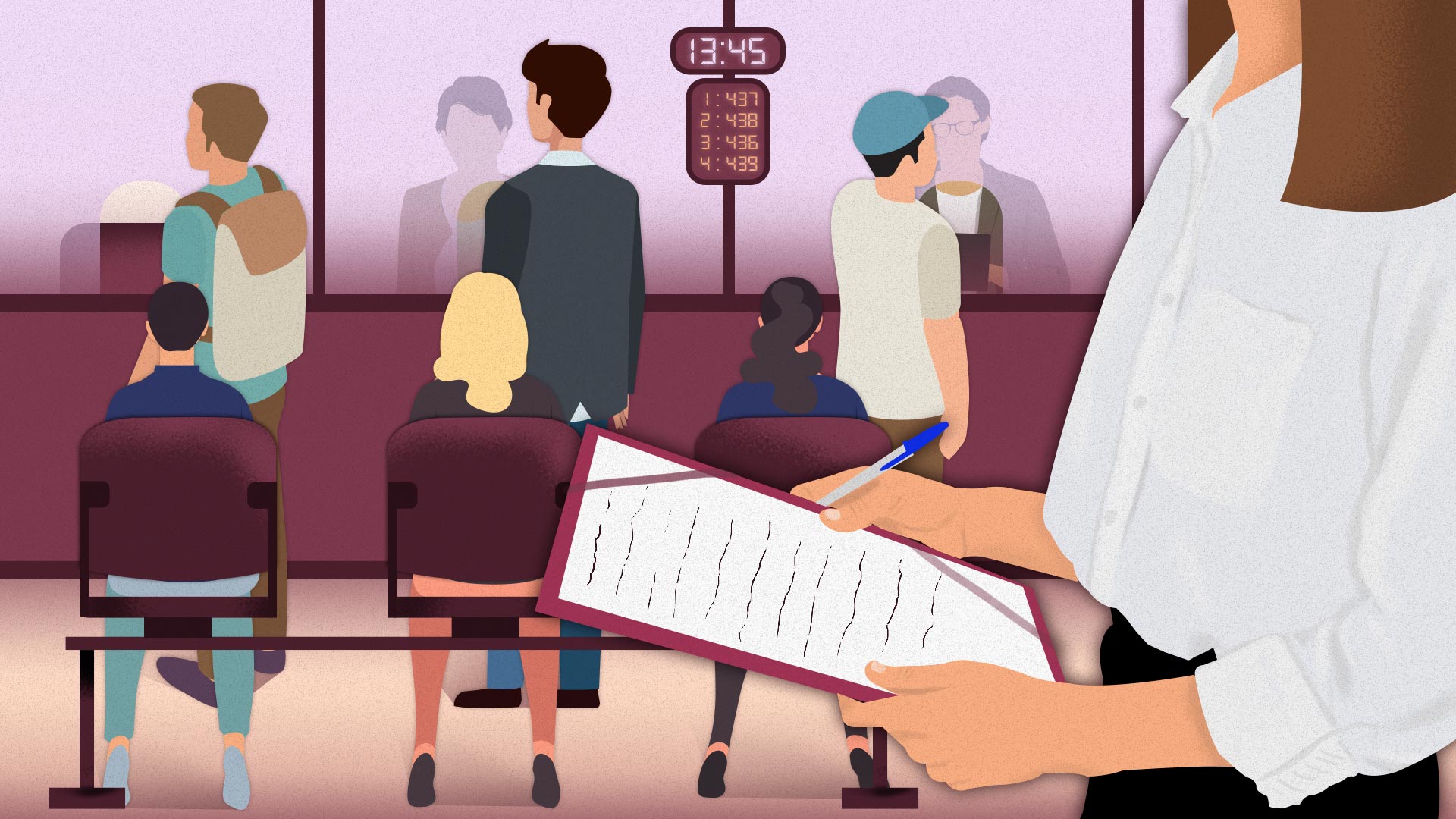
Elites with their backs to the wall
"My husband and I applied together, I was turned down and he got it. Welcome to my husband, I guess!" Zeineb giggles.
Zeineb, a Tunisian journalist and financial executive, was planning to go on a business trip to France with her husband "a senior executive in a public institution" in July 2022. She was hoping to take advantage of an invitation from his employer to go sightseeing for six days. It's a seemingly uncomplicated plan for the couple, who have already been to France on several occasions.
After weeks spent putting together her application, hundreds of dinars spent and endless paperwork, Zeineb and her husband hit the road from their home in Gabès for a journey of over five hours to TLScontact in Tunis. When Zeineb received her passport, she didn't find the visa stamp on it, but a simple sheet of paper with a box ticked: her application had been rejected on the grounds of 'insufficient funds for the duration of her stay', or 'reason 4'.
"I was really shocked. I felt a mixture of anger and humiliation that, after all that hassle, my application was rejected without any explanation [...] It was an extremely upsetting moment that really shook me to my core." said Zeineb with a deep sadness in her voice.
Her husband got his visa, but refused to leave without her and cancelled his trip. This decision is, in Zeineb's opinion, discriminatory against Tunisians. "Everyone is welcome in our country, I don't understand why we should limit people's freedom of movement", she added indignantly.
Several of the people interviewed by inkyfada have been denied visas, despite their family members applying simultaneously and being granted theirs. Family reunification or ties with France are no longer sufficient grounds for obtaining this right to mobility. It is worth noting that visa applications are already limited to a specific category of applicants, typically those who can afford the associated costs..
"The financial aspect is perhaps the biggest challenge (...). Students, self-employed people... People who make a decent living in Tunisia, but who don't dare apply for fear of being rejected", described Ahmed Jemaa.
On the same subject
"It's a feeling of unease, of ungratefulness"
Zied had been separated from his family for months due to visa issues. As a radiologist and clinic director in Tunisia for three years, he made the decision to relocate to France with his wife and two-year-old daughter. He got a head start and settled in a small town in the Manche department, eagerly anticipating their arrival on a long-stay visa. However, their plans were abruptly derailed when his wife and daughter's visa applications were rejected in September 2022. Zied expressed his feelings of despair, stating, "I feel depressed, and so does my wife. We’re trapped in this situation."
"I was so motivated at the beginning of this experience, I used to spend most of my day at the hospital. It's been a month now, and I've totally lost the desire to work. I'm so disappointed," lamented the radiologist.
On top of that, Zied is currently awaiting his residence permit. In a show of support, the hospital staff where he works have taken action by signing a petition with 1 600 signatures, urging the authorities to expedite the processing of his papers so that he could be reunited with his family. Zied stressed the importance of his presence as one of four radiologists across two hospitals, stating, "If I leave, there will only be three radiologists left. This shortage of doctors creates significant insecurity for both patients and paramedical staff."
Zied's daily life is extremely difficult without his wife by his side. A road accident in 2011 left him severely disabled. Describing his condition, he explained, "I have brachial plexus palsy, which means that my entire right upper limb doesn't work."
Zied is currently still waiting to receive his disability card, which would enable him to receive the appropriate care at home. He highlighted the challenges he faces doing household chores with only one functional hand. He explained, "I struggle to handle everyday tasks like eating or doing laundry. Finding practical solutions has become a constant challenge for me."
"We're trying our best to reunite with our families, to have a balanced life and professional stability, but now we're personally affected. It's a feeling of unease, of ungratefulness... (...) I'm a doctor and I do what I can to help," Zied concluded.
Zied's visa recently expired in May, and while he has been granted an exceptional extension until August, he is prohibited from leaving French territory. This situation presents a bittersweet solution for the doctor. Having already endured a year of separation from his family and feeling drained by bureaucratic hurdles, Zied has set a deadline for himself. If he does not get his residence permit in the coming months, he plans to quit his job and move back to Tunisia, where he believes there are ample opportunities as well.
A visa with a hint of defeat
A Facebook post went viral on June 11, 2023. Wafa, a young filmmaker and architecture student, was outraged that both she and her colleague Khalil had been denied visas to France, despite being invited to the prestigious Annecy Film Festival, where their first film had been selected in competition in the short-film category.
As soon as she put together her visa application file, Wafa felt apprehensive about the process. "I’m well aware of my context... I don't know anyone who hasn't had a problem with this." However, the organizers of the Annecy Film Festival had assured her that they would handle everything, including accreditation, accommodation, and local expenses. The visa refusal by the French authorities came as a shock to both Wafa and the organizers. Adding to their frustration, the Consulate ceased all communication on May 25, despite having received additional documents.
Wafa's social media post gained such momentum online, leading the French Consulate in Tunis to respond on June 13. In addition to the reasons listed on the sheet she received from TLS, such as unreliable information provided or concerns about sufficient means of subsistence during her stay, the Consulate's Facebook comment mentioned missing documents as another reason for the rejection. Wafa found the situation ridiculous, stating with a chuckle "I must have a total of four or five reasons for refusal."
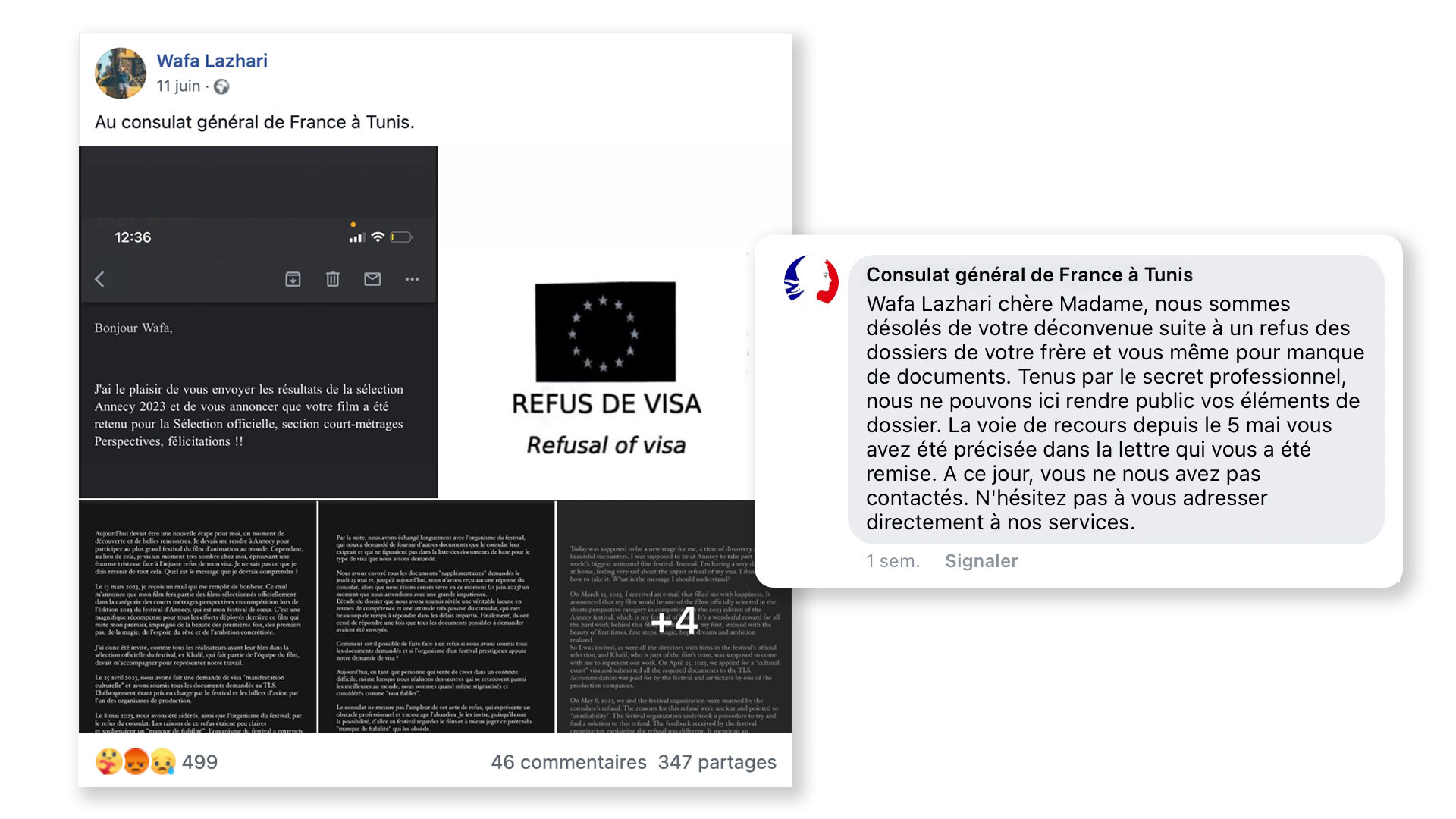
Wafa's Facebook post on June 11, 2023 and the reply from the French Consulate in Tunis on June 13
Then, on June 15, the young woman received an unexpected phone call: "Hello Miss Wafa, please bring your passport back to the Consulate as soon as possible", Wafa recalled. As for Khalil, he was not invited.
Wafa complies and heads straight for the French Consulate in Tunis, where she was instructed to wait on the other side of the barbed wire:
"I gave my passport to a woman through the fence and she came back after 20/30 minutes with the visa stamp".
She caught a last-minute flight and took part in the last days of the festival. This outcome, however, is no victory for Wafa, who, more than anything else, wants to understand the real reasons why she and her colleague Khalil were turned down.
"I still don't know the real reasons for the refusal. I was suddenly deemed reliable, without any explanation, and Khalil still wasn’t, even though our files were virtually identical. (...) I felt extremely angry, even when I was about to leave. It's even worse for Khalil, he couldn't even attend the festival", said the distraught Wafa.
The artist believes her story is by no means unique. "Everyone has kind of projected themselves onto my publication. There's obviously a problem," Wafa concluded.
